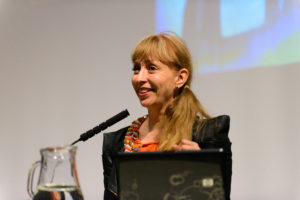The rise of technology and the human condition
The increasing prevalence of technology in leisure and learning is having a profound and potentially negative effect on how humans interact with each other, empathise and behave creatively, according to one of the world’s leading neuroscientists.

Baroness Susan Greenfield
Baroness Susan Greenfield has spent years researching – through the prism of neuroscience – how technology will impact the brain.
She says the changes being wrought by technology on our brains amount to a process of global ‘mind change’.
Speaking at the EduTech conference in Brisbane last month, Baroness Greenfield said the pace of technological and thus social change was “unprecedented”.
“People talk about the inventions of the car or the printing press and compare them to the technology revolution of the 21st Century,” she said.
“It’s nonsense. The change we are seeing is unprecedented,” Baroness Greenfield said.
“The difference between the new technology and the printing press is that it is not a means to an end… it’s an end in itself… a parallel lifestyle or universe.”
She said some studies showed 13–18 years-olds in the western world were spending up to 18 hours a day in front of a screen.
“What we are seeing is concerning, I believe, for a number of reasons.
“There is a risk we will see an erosion of childhood, increased aggression, attention problems, the rise of addictive reward-seeking behaviour and breakdown in the skills needed to conduct interpersonal relationships,” Baroness Greenfield said.
She said the brains of young people were being affected in a number of ways and that gaming was one problematic area.
“Games, especially violent games, could make young people become more adversarial and habituative,” Baroness Greenfield said.
“We are seeing problems with sustained attention and reward-seeking addictive behaviour.
“What happens with gamblers and obese people is that the sensory pleasures trump the potential consequences and this can happen with video games when the balance is tipped inappropriately and damagingly,” she said.
Baroness Greenfield said other areas of concern were social networking and search engines.
“In the real world words are only ten per cent of our contact with other people. There is also, body language, facial expressions, nuances of speech and even pheromones,” she said.
“But these things – nature’s handbook on personal contact – aren’t available on Facebook.
“The brain is dynamic and adaptive. But when we tweet for instance, we seem more concerned with our brand than with being ourselves. So we are seeing an increase in narcissism and a drop in self-esteem,” Baroness Greenfield said.
She said previous generations made up games as children and were in control of their own narratives and imagination.
“Now, it’s different. Kids are sitting in front of a screen and their narratives and imaginations are being drive by a game.”
Baroness Greenfield said the current ‘Google generation’ was in danger of falling victim to a ‘cut and paste’ mentality where everything could be looked up and there were lower rates of recall.
“This also brings the danger that young people’s ability to be creative suffers because of the nexus between knowledge and information,” she said.
“Knowledge is a set of facts… information is what makes it useful to us,” she said.
Baroness Greenfield likened this ‘mind change’ to climate change in that it was controversial, global and unprecedented.
“But unlike climate change, which is an exercised in damage limitation, we have the opportunity to do something about ‘mind change’,” she said
“With mind change, we don’t need to be merely mitigating, we have a chance to explore what we really want,” Baroness Greenfield said.
And despite her gloomy prognosis on the march of technology on traditional human mindsets, she had some suggestions about how to cope with the future.
She said stories were important.
“Stories help us make sense of the world. They are the staple of every culture on the planet and they give a conceptual framework to the world,” she said.
“We as humans have a need to join the dots to achieve understanding and not just information processing. Stories help us do that.”
Baroness Greenfield said physical activity and placing a premium on individuality were also crucial.
“Physical activity enhances learning and memory and also people need to feel special and feel individual.
“An original idea is much more exciting than a new pair of trainers which your neighbour will end up owning a pair of anyway,” she said.
“New ideas are important and currently education has an over-emphasis on facts.
“If you want to be truly creative, you need time and space to incubate and think,” Baroness Greenfield said.
She said her research was underpinned by the notion that the brain was what made humans unique.
“The brain is an astonishing thing and it’s the thing that is most wonderful about human beings. It is what makes us individuals. No one has a brain or a mind like anyone else’s,” Baroness Greenfield said.
“It gives us the ability to adapt to our environment. Our uniqueness comes through brain which gives us our identity and individuality.”
She said the patterns of connections in the brain are shaped by experiences and brain connections are increased by stimulation which often comes from an enriched environment.
“Stimulating experiences make brain cells work harder and create branches which grow and make connections with other cells. These connections give a personalised meaning to the world,” Baroness Greenfield said.
Laurie Nowell
AMES Australia Senior Journalist












